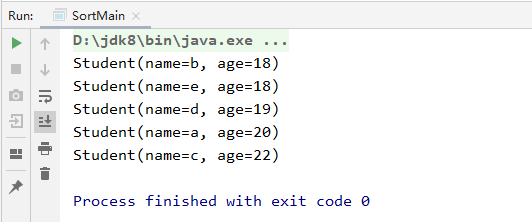preface
This article briefly summarizes the common methods in Lambda
For students unfamiliar with Lambda, please refer to this article for introduction Understanding of Lambda , Lambda is really more comfortable
If you are new to Lambda, but are not familiar with Consumer, Supplier, Predicate and Function, please refer to this article Quick understanding of Consumer, Supplier, Predicate and Function
If you are already familiar with Lambda, but you don't understand its execution principle, please refer to my article Lambda execution principle
Let's start with an example
Here are five students. Put them into the group
@Data
@AllArgsConstructor
class Student {
private String name;
private Integer age;
}
Student a = new Student("a", 20);
Student b = new Student("b", 18);
Student c = new Student("c", 22);
Student d = new Student("d", 19);
Student e = new Student("e", 18);
List<Student> list = new ArrayList<>();
list.add(a);
list.add(b);
list.add(c);
list.add(d);
list.add(e);
In daily development, there may be the following requirements:
1, Traverse the set
list.forEach(System.out::println);
forEach accepts a Consumer expression
2, Take out the student's name
List<String> nameList = list.stream()
.map(Student::getName)
.collect(Collectors.toList());Stream can transform one form of stream into another. The code above is to transform the stream containing the whole student object into a stream containing names separately. Finally, collect the stream.
3, Take out students older than 19
List<Student> studentList = list.stream()
.filter(s -> s.getAge() > 19)
.collect(Collectors.toList());The filter receives a Predicate expression and discards the student objects that do not match the expression in the stream.
4, Take out the age of students without repetition
List<Integer> ageDistinctList = list.stream()
.map(Student::getAge)
.distinct()
.collect(Collectors.toList());Just like mysql's de duplication keyword, it uses distinct
5, Full match, any match, none match
Requirement 1: whether all students are over the age of 18 (full match)
boolean flag = list.stream()
.map(Student::getAge)
.allMatch(i -> i > 18);Requirement 2: whether there are students older than 21 (any matching)
boolean flag = list.stream()
.map(Student::getAge)
.anyMatch(i -> i > 21);Requirement 3: whether all students are no older than 22 (no match)
boolean flag = list.stream()
.map(Student::getAge)
.noneMatch(i -> i > 22);6, Sort
Needs, sorted by age of student
list.stream()
.sorted(Comparator.comparingInt(Student::getAge))
.forEach(System.out::println);Output:

The default is to output in ascending order according to age, or in descending order, as long as.reversed is added, as shown in the following figure
list.stream()
.sorted(Comparator.comparingInt(Student::getAge).reversed())
.forEach(System.out::println);If you sort by age and then by name, you can write:
list.stream()
.sorted(Comparator.comparingInt(Student::getAge).thenComparing(Student::getName))
.forEach(System.out::println);7, Pagination
Requirement: the current page is page 2, with 3 items per page
list.stream()
.sorted(Comparator.comparingInt(Student::getAge))
.skip((2 - 1) * 3) //(current page - 1) * number of items displayed per page
.limit(3) //Number of items per page
.forEach(System.out::println);First, sort by age, then skip the data on the previous page and take out the limit data.
8, Grouping
Needs: grouped by age
Map<Integer, List<Student>> group = list.stream().collect(Collectors.groupingBy(Student::getAge));
group.forEach((k, v) -> System.out.println("k:" + k + ",v:" + v.toString()));Output:

9, String splicing
Requirement: output comma separated string of student name
String str = list.stream().map(Student::getName).collect(Collectors.joining(","));
System.out.println(str);Output:

10, Mathematical operation
Demand 1: find the total age of students
int sum = list.stream().mapToInt(Student::getAge).sum();
System.out.println(sum);Demand 2: average age of students
double average = list.stream()
.mapToInt(Student::getAge)
.average()
.orElse(0.0);
System.out.println(average);Note that average() returns an OptionalDouble, and in order to prevent the collection from having no elements, we must use orElse to specify a default value.
Similarly, max is used to get the maximum value, min is used to get the minimum value, and the default value needs to be specified.
Continue to add cases